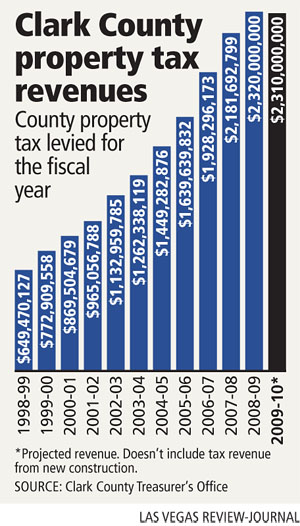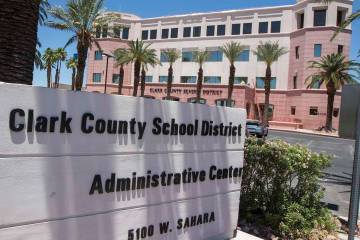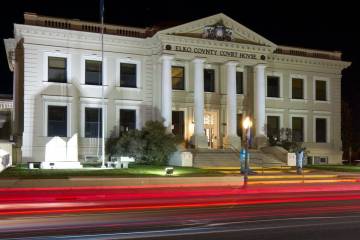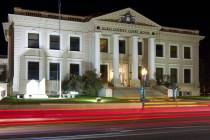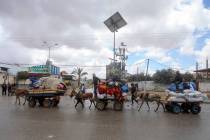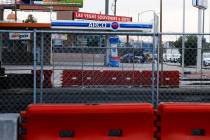Forecast gloomy for property tax revenues
An ailing real estate market could cause property tax revenue to stay flat or even dip in Clark County, a prospect that longtime officials say is unheard of and troubling.
The county Treasurer's Office released a forecast of 2009-10 property tax revenues at the request of local leaders who wanted an idea about how much money they'd have for their upcoming budgets.
Early numbers inspired hand-wringing.
Property tax revenue was pegged at $2.31 billion, slightly below the $2.32 billion collected in the 2008-09 year.
County, Las Vegas and North Las Vegas officials complained that zero growth will throw their governments into the red because they have built-in cost increases each year, such as pay raises mandated by labor contracts.
Property taxes replenish the general fund, which in turn pays personnel costs, they said.
"About 65 percent of the general fund is spent on people," said Don Burnette, the county's chief administrative officer. "If our general fund revenues are flat or potentially declining, that's a difficult thing for us to address."
Burnette said he'd never seen revenue growth stall like this in the 19 years he's been in the county manager's office.
Rebecca Coates, assistant treasurer, cautioned that the numbers don't include money from last year's new construction. Also, the figures could change after the state sets the tax rates for the year, she said.
"That's a moving target," Coates said. "What it looks like in July can be completely different."
She noted this was the first time her office issued such an early forecast.
However, Rocky Steele, assistant county assessor, said new construction dollars won't come close to the previous year's $69.7 million, given the market's slump.
About 25,000 permits have been issued since July, about half the number dispensed during the last fiscal year, Steele said. "They've started to dwindle. We anticipate a pretty sharp reduction."
Roughly 717,000 of the county's 724,000 parcels have depreciated in the past year, and more than 200,000 property owners could pay lower taxes this year, according to the assessor's estimates.
North Las Vegas's property tax revenue has grown by an average of 15 percent in the past few years, which makes this bout of no growth feel like slamming on the brakes, one city official said.
"North Las Vegas has been the fastest growing city in Nevada ... and one the fastest growing cities nationwide," said Phil Stoeckinger, the city's finance director.
If the city had stuck to its normal pattern, this year's general fund of $28 million would have swelled to $32 million next year, he said, but it will, at best, stay the same.
Stoeckinger blamed falling land values, compounded by foreclosures, for the stagnant numbers.
This inertia will force tough decisions, such as putting off important projects or leaving jobs vacant, even in vital services, he said.
No matter how strained the budget, North Las Vegas is obligated to give employees a 3.8 percent cost-of-living raise plus an average step increase of 5 percent, Stoeckinger said.
Las Vegas City Manager Mark Vincent said he's not surprised that revenues are anemic.
"I've seen as much as a 70 percent drop in land value," Vincent said. " Without a doubt it's going to be worse."
Three labor bargaining units have expressed a willingness to renegotiate contracts, Vincent said, calling that a good start.
Burnette said the county will pay about $24 million to cover the average 6 percent increase in workers' annual pay.
One bright note, he said, was that 491 workers took voluntary leave during a five-week trial period, saving the county $280,000.
The county offered voluntary furloughs, left 350 jobs unfilled and cut services to offset the downturn that accelerated last year and is now showing up in the treasurer's report, Burnette said.
"We're just preparing for the worst," he said.
Contact reporter Scott Wyland at swyland@reviewjournal.com or 702-455-4519.



